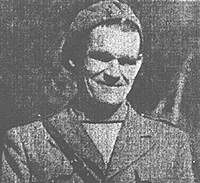 Fred Copeman was born in 1907 and joined the Royal Navy at fourteen. He played a major role in the Invergordon Mutiny of 1931 and was cashiered from the Navy. In the 1930's he became a prominent figure in the Unemployed Workers' Movement. During the Spanish Civil War he joined the Communist Party and became a member of the British Party's Central Committee.
Fred Copeman was born in 1907 and joined the Royal Navy at fourteen. He played a major role in the Invergordon Mutiny of 1931 and was cashiered from the Navy. In the 1930's he became a prominent figure in the Unemployed Workers' Movement. During the Spanish Civil War he joined the Communist Party and became a member of the British Party's Central Committee.
He arrived in Spain in December 1936 and at Madrigueras became a machine gun instructor. At Jarama in February 1937 he was Second in Command of No 2 Company (machine guns) and was wounded three times. In June 1937 he was appointed Battalion Commander from June-July 1937 and again in December 1937. At Brunete in July 1937 he was again wounded and the strain of the battle and heavy losses suffered by the Battalion led him to be relieved of Command. He went home briefly and was strongly criticised by the Communist Party but was allowed back to Spain. He was relieved of Battalion Command a second time when he developed appendicitis near Teruel and was invalided home in April 1938.
On becoming Commander Copeman had two strict rules: the men were to salute officers, and neither deserters nor POWs were to be shot. (although at Jarama he did threaten to lob a grenade amongst men who had fled and refused to come out of cover and return to the battle).
When a Scotsman refused to salute him, Copeman knocked him out. Copeman was a big man and an ex-boxer; several volunteers claim he was not afraid to use the threat of violence to get orders obeyed. He was ready to put new ideas into practice and when Professor Haldane lectured on machine gun crossfire he used this to deadly effect in action.
On becoming Commander he refused to recognise that the Battalion Commissar (Tapsell) had any power over his decisions, which was accepted. He was a tee-totaller and was strongly against drunkenness. He distrusted the middle class and `intellectual' volunteers and put them in a separate anti-tank unit. At meal times there was a separation between the officers and men, which made him unpopular.
On his return home he worked for Dependents Aid, but by 1939 he had broken with the Communists. During World War II he became an expert on air raid precaution and even lectured to the Royal Family. He became a Roman Catholic and was awarded an OBE for his services during World War II.
British Battalion Commanders in the Spanish Civil War
Back to Abanderado Vol. 6 No. 3/4 Table of Contents
Back to Abanderado List of Issues
Back to MagWeb Master Magazine List
© Copyright 2003 by Rolfe Hedges
This article appears in MagWeb.com (Magazine Web) on the Internet World Wide Web. Other articles from military history and related magazines are available at http://www.magweb.com